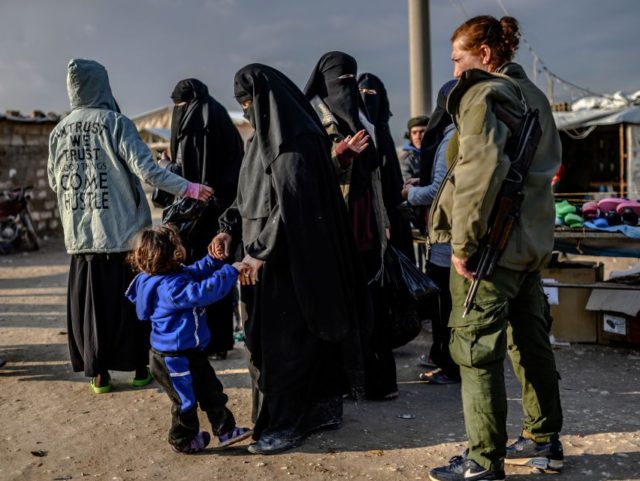Syrian Kurdish authorities said on Wednesday they have repatriated two women who married Islamic State fighters and six children to the United States at the request of the U.S. government.
Thousands of women and children are in Kurdish custody following the collapse of the ISIS “caliphate” in Syria, many of them citizens of foreign countries who traveled to Syria to become citizens of the Islamic State.
The Kurds frequently warn they lack the resources and legal mechanisms to hold foreign prisoners indefinitely, but other countries are not eager to reclaim ISIS jihadis and their families. A Kurdish official told Reuters that foreign governments have become more amenable to repatriating citizens for “humanitarian” reasons, a definition that may eventually cover most of the widows and orphans left behind by slain Islamic State fighters.
“Several U.S. citizens, including young children, have been safely recovered from Syria and we are assisting them with repatriation to the United States,” a U.S. State Department official told CBS News when asked about the Kurdish statement.
The official said the U.S. government is carefully reviewing claims of citizenship by prisoners in conflict zones on a “case-by-case basis” and will “continue to repatriate and, when appropriate, prosecute its citizens.” He noted the difficulty of handling these cases in countries like Syria, where the United States lacks consular services.
CBS recalled an American woman and four children were repatriated from Syria this year. The best-known case of an ISIS wife whose repatriation request was denied is Hoda Muthana, who journeyed to the Islamic State at the age of 20, married three different jihadis, and surrendered to coalition forces in January. The Trump administration has refuted her claims of U.S. citizenship.
Muthana’s 20-month-old son has reportedly grown “sickly” and “lethargic” in the Syrian detention camp where she resides, leading to requests for the child to be brought to the United States and placed in the custody of his grandparents while her case is adjudicated.
France’s top administrative court in April rejected demands from repatriation from French nationals in Syria captured while serving the Islamic State, arguing their disposition is a matter for “negotiations with foreign authorities” to settle.
France and most other European countries lean towards putting captive Islamic State recruits on trial before an international tribunal. One of the major concerns with repatriation is that Western legal systems would be prone to dismissing terrorism charges against Islamic State veterans because high-quality evidence for a trial is difficult to obtain from the battlefields of Iraq and Syria.
Even positively identifying the prisoners has proven exceedingly difficult, as they often discarded paperwork from their countries of origin and joined the Islamic State under assumed names. Many of the prisoners refuse to recant their belief in Islamic State fascism and jihad.
“There is nothing else in the world that compares to this unprecedented humanitarian and security situation, which is legally complicated and politically fraught,” a senior U.S. State Department official told the New Yorker in April.

COMMENTS
Please let us know if you're having issues with commenting.